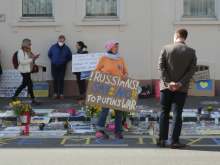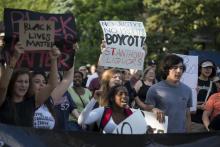Criticisms of the boycott
While the response to boycott calls has been significant, it has faced criticism.
1) A false sense of achievement
Patrick Cockburn argued in iNews that sanctions “give a false sense of achievement which is largely illusory”. He argues that while they “inflict collective punishment on entire populations” the “least affected are invariably the country’s leadership”.
Others however, argue that sanctions can have a powerful impact, such as Anita Ramasastry at the School of Law at the University of Washington.
2) Ordinary civilians pay the price?
One criticism is that the impacts of companies exiting Russia upon ordinary people has not been fully considered. Some argue that more energy needs to be put into thinking about what sorts of economic activity leads to bad outcomes for ordinary people, and which sorts overcome these outcomes.
Measures such as Visa and Mastercard leaving the country could also cut off Russians who are critical of the invasion, leaving them without access to funds, according to one journalist who told the BBC “thousands of people, including not only journalists but opposition activists and even common people who are scared of Putin's regime and are running from war will be cut from their little money.”
Pharmaceutical products are for example important for the general health of the Russian population so it could be considered important that these do not fully withdraw from Russia.
Cockburn, a journalist in the inews, argues that when Iraq faced sanctions these led to “children dying in hospitals because there were not enough oxygen cylinders”. He says “People outside Iraq wrongly felt that economic warfare must be kinder than the military variety”.
This assertion appears to fly in the face of overwhelming evidence that, in the main, economic ‘warfare’ is considerably kinder than dropping bombs on people. It has been a core understanding of and the basis for the international architecture for peace that is now manifest in the UN institutions. Economic measures are rightly encouraged as a first resort in cases of conflict.
Some still argue that for the sake of ordinary citizens, blanket sanctions should not be used and instead more consideration should be paid to advisors and organisations that advise on how businesses should operate or responsibly withdraw from conflict zones. Targeting ‘oligarchs’ certainly appears to be the focus of the rhetoric of western governments to date.
Meanwhile Mark B. Taylor of the Institute for Human Rights and Business has expressed concerns that current sanctions could appear to be rooted in nationalist ‘security’ ideology like that used to justify the ‘War on Terror’, as opposed to equivalent measures which could be rooted in humanitarian concerns.
3) It can appear uncritical of the Ukrainian government
The Glastonbury 2022 festival was opened with a video recording of Ukrainian president Zelensky calling for people around the world to put pressure on politicians to “join us in defending freedom and truth”.
Yet the Ukrainian regime is still criticised, for example by Amnesty International, for a range of reasons. According to Amnesty, the president and 37 other Ukrainian politicians have benefitted from offshore companies. Amnesty says “impunity for torture and other ill-treatment in general” remains endemic in Ukraine, and says that allegations against law enforcement officers of abuse were dealt with slowly and ineffectively.
The idea that we should boycott Russia to support Ukraine could therefore be seen to be overly uncritical of Ukraine, whitewashing the country’s own internal problems when it comes to transparency and human rights.









